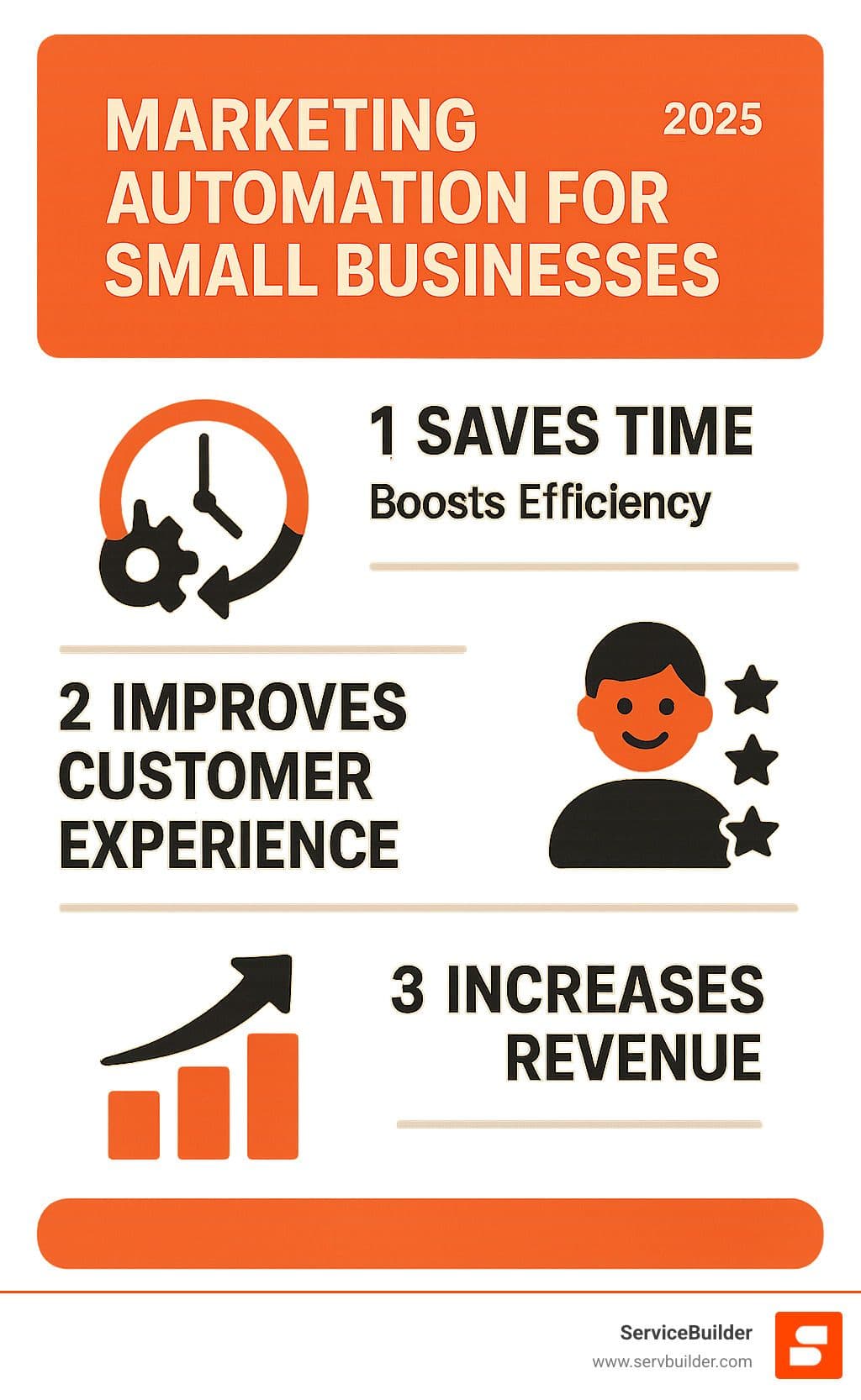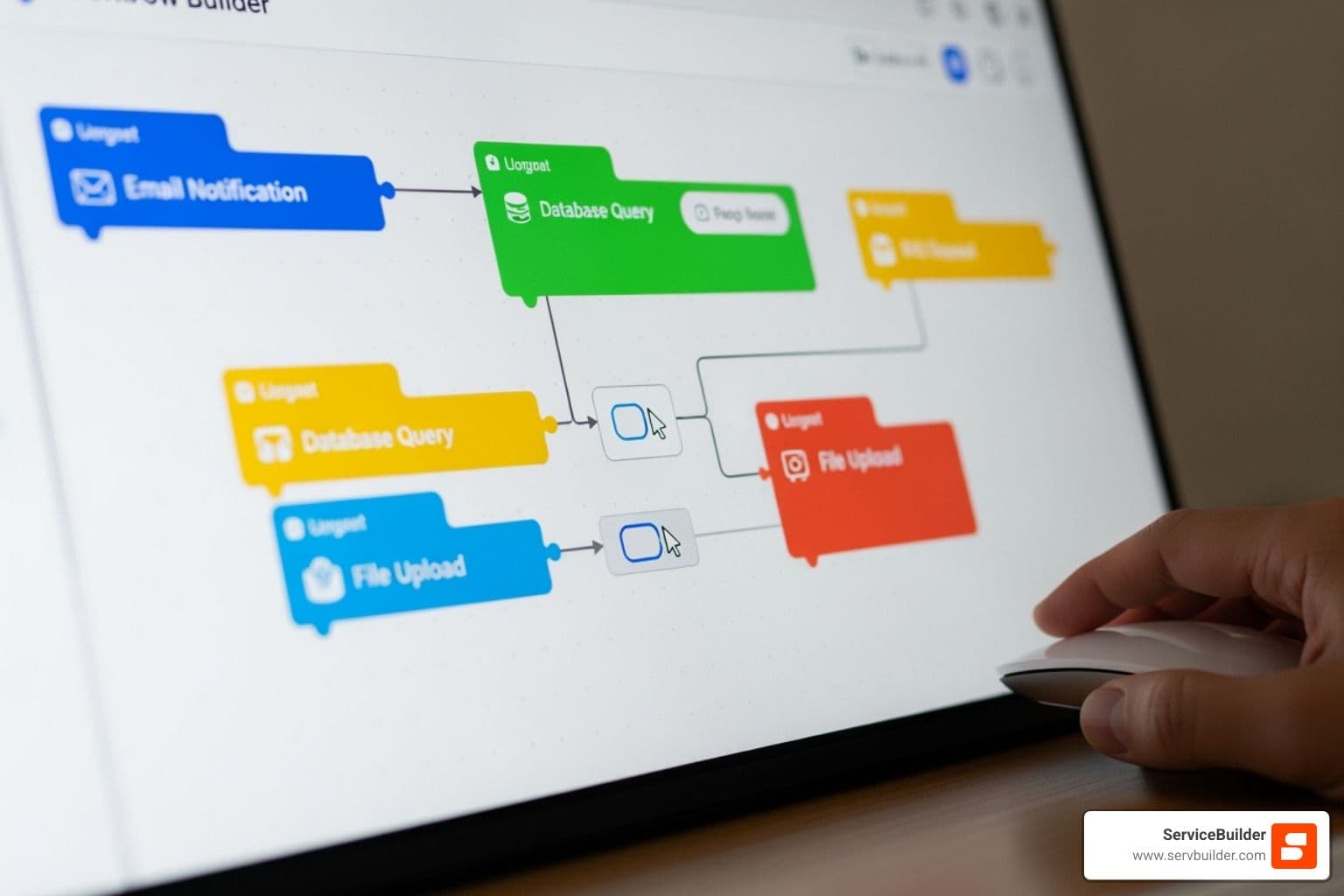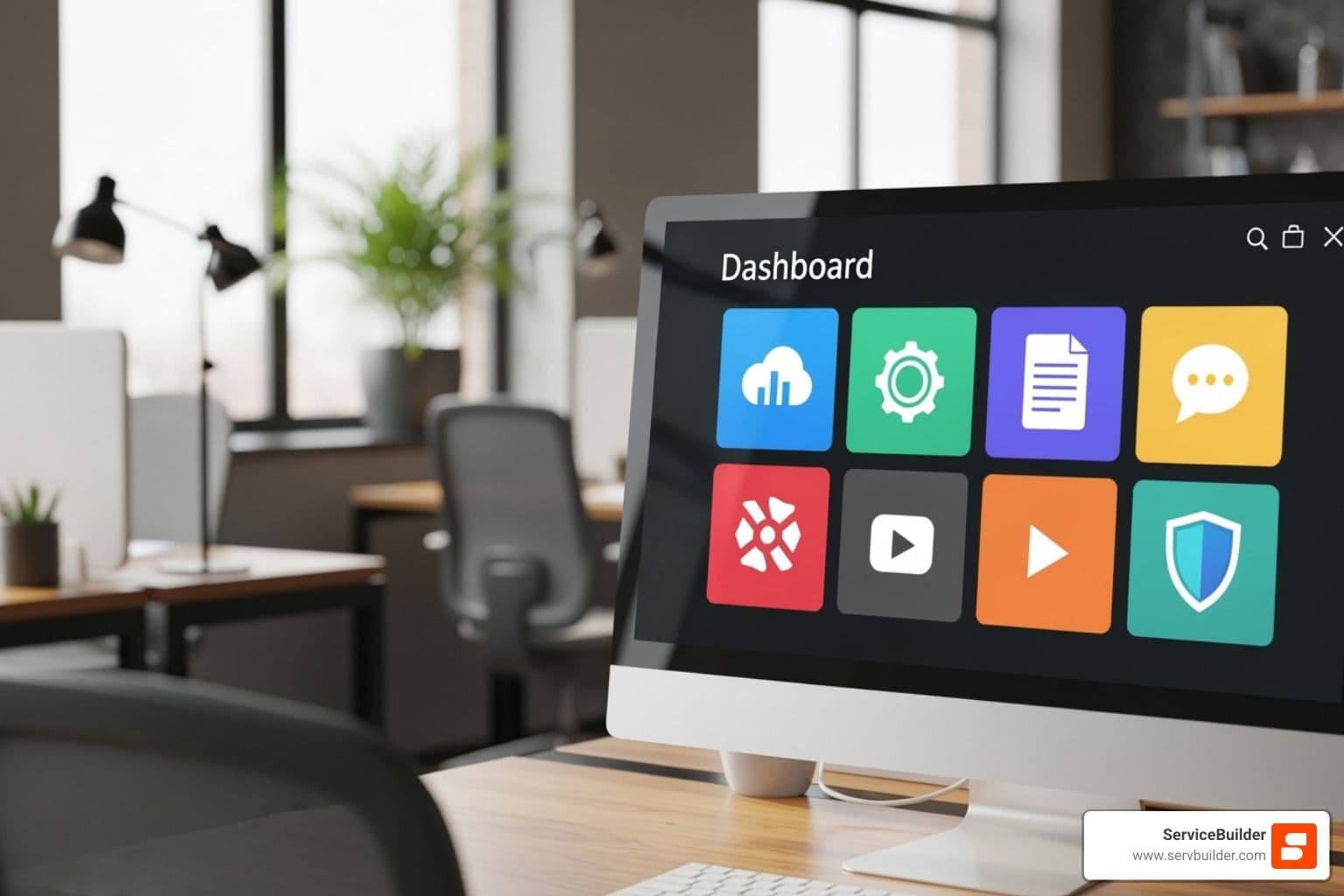Marketing Automation Magic: Top Tools for Small Businesses
- Andrew Leger
Marketing Automation for Small Businesses: Your Path to Growth¶
Are you a small business owner looking to grow without getting bogged down by endless tasks? Marketing automation for small businesses is your answer. It’s about using smart software to handle repetitive marketing chores, freeing you up to focus on what truly matters: strategy, customer relationships, and growth.
It’s a game-changer for businesses like yours, helping you save time, deliver personalized customer experiences, and drive revenue. By automating lead nurturing and follow-ups, businesses see a 14.5% increase in sales productivity as their teams focus on hot leads. In this guide, we'll explore how to implement these tools to transform your operations.
As the founder of ServiceBuilder, I’m Andrew Leger, a software engineering leader with over 15 years of experience building enterprise systems. My insights into marketing automation for small businesses come from a deep understanding of what helps field service companies streamline operations and grow profitably.

Marketing automation for small businesses terms simplified:
automated business process workflow
automated business communication
automated accounts receivable system
Why Marketing Automation is a Game-Changer for Small Businesses¶
For small businesses, marketing automation isn't a luxury—it's the engine for survival and growth. Many owners assume it's only for large corporations, but the return on investment is compelling for any size business. For every dollar spent, marketing automation can return an average of $5.44 within three years, with most businesses seeing a payoff in under six months.
The numbers tell a powerful story. Automation drives a 14.5% increase in sales productivity and cuts marketing overhead by 12.2%. This means your sales team can focus on closing deals instead of chasing cold leads, and your marketing budget works harder.
The real magic happens when you connect marketing automation with a solid CRM Platform. This creates a seamless handoff from marketing to sales, nurturing leads until they are ready to buy. Companies that excel at this generate 50% more sales-ready leads at a lower cost.
At ServiceBuilder, we've seen field service businesses transform when they accept automation. From Automated Business Communication to streamlined scheduling, the goal is to free up your time to focus on growth.
Key Benefits of Implementing Marketing Automation¶
Let's get practical about what marketing automation for small businesses does for you day-to-day.
Time and Cost Savings: Automation handles repetitive tasks like welcome emails and follow-ups 24/7, reclaiming hours each week and reducing the need for additional staff.
Improved Personalization: Modern tools segment customers based on behavior, allowing you to deliver personalized content that resonates. As Adobe notes, this makes each customer feel understood.
Better Lead Quality: By tracking how prospects engage, automation helps you identify the hottest leads—those who have opened multiple emails or visited your pricing page—so your team can focus its energy effectively.
Data-Driven Decisions: Your platform shows you exactly which campaigns drive revenue, replacing guesswork with clear, actionable data.
Scalability: Whether you have 100 customers or 10,000, automation scales with your business without a proportional increase in effort.
How Automation Drives Revenue and Growth¶
Here’s where marketing automation for small businesses proves its worth by directly boosting your revenue.
Lead Scoring: Identify your hottest prospects by tracking their interactions. When a lead shows high interest, automation flags them for your sales team.
Upselling and Cross-Selling: The probability of selling to an existing customer is 60-70%, compared to just 5-20% for new prospects. Automation identifies opportunities to suggest additional services at the right moment.
Abandoned Cart Recovery: For service businesses, this means following up on unaccepted quotes or unconfirmed appointments. A timely, automated reminder can recover a significant percentage of these interactions.
Improved Customer Lifetime Value: Automation keeps you connected with customers through check-ins, maintenance reminders, and seasonal offers, building loyalty that leads to repeat business and referrals. Our Automated Accounts Receivable System is a prime example, ensuring you get paid faster and more consistently.
By automating routine tasks, you free yourself up to focus on what really matters: building relationships and growing your business.
Getting Started: Your Simple Guide to Marketing Automation for Small Businesses¶
Starting your marketing automation for small businesses journey doesn't have to be complicated. Modern tools offer simple drag-and-drop interfaces, making it easy to build powerful workflows.

Here's how to begin:
Start Small: Identify your most repetitive tasks. Is it sending welcome emails or appointment reminders? These are perfect candidates for your first automation.
Set Clear Goals: Define what you want to achieve. Are you trying to nurture leads, reduce no-shows, or increase repeat business? A specific target helps you measure success.
Choose the Right Software: Look for a platform that solves your immediate problems without being overly complex or expensive. You can always upgrade as your business grows.
Build your Automated Business Process Workflow one step at a time. Start with a single automation, master it, and then expand. You can follow proven steps to get started with simple paths that work for small businesses.
Common Automation Workflows to Implement First¶
These four automations deliver the biggest impact early on:
Welcome Email Series: When someone first interacts with your business, they are highly engaged. Welcome emails have an impressive open rate of nearly 58%, making them perfect for creating a strong first impression.
Lead Nurturing Sequences: Most leads aren't ready to buy immediately. A series of helpful, automated emails builds trust over time, keeping you top-of-mind when they are ready.
Appointment Reminders: For service businesses, no-shows are costly. Our Automated Appointment Confirmation system uses SMS and email reminders to dramatically reduce missed appointments.
Customer Feedback Surveys: After a service, automatically send a survey. This shows customers you value their opinion and gives you a chance to address issues or collect positive reviews.
Overcoming Common Challenges¶
Adopting marketing automation for small businesses can present a few problems, but they are manageable. Budget constraints are a top concern, but many platforms like Mailchimp offer free plans to get started. While there's an initial time investment, it pays off quickly by saving you hours each week. If you feel overwhelmed by technical complexity, look for user-friendly platforms with strong customer support and tutorials. The key is to start simple and focus on the automations that will have the biggest immediate impact on your business.
The Top Marketing Automation Tools for Small Businesses in 2024¶
Choosing the right tool is like hiring a new team member—you want one that fits your budget, understands your needs, and can grow with you. For field service businesses, this means finding a platform that combines marketing automation with core operational tools like scheduling, dispatching, and invoicing. The key is finding a solution that streamlines your entire workflow, from lead to payment.
When evaluating tools, we focus on automation capabilities, integration with field service operations, price-to-value, ease of use, and reporting.

[TABLE] Comparing Top Field Service Management Platforms¶
Platform
Best For
Key Features
Starting Price
Jobber
Small home service teams
User-friendly job management, automated quote & invoice follow-ups
From $49/month
Housecall Pro
Growth-focused businesses
Strong marketing suite, online booking, review management
From $65/month
ServiceBuilder
All-in-one operational efficiency
AI-assisted scheduling, integrated marketing & CRM, mobile-first design
Custom pricing
Best for Getting Started: Jobber¶
Jobber is a popular choice for small home service businesses due to its user-friendly interface and strong core features. It excels at job management—quoting, scheduling, and invoicing. Its automation is practical and effective, focusing on key touchpoints like sending automated follow-ups for quotes and invoices. While its marketing features aren't as extensive as some competitors, it provides a solid foundation for businesses looking to organize their operations and automate essential communications first.
Best for Marketing-Led Growth: Housecall Pro¶
Housecall Pro is designed for service businesses that are ready to invest in marketing to drive growth. It offers a more robust suite of marketing tools, including email marketing campaigns, postcard automation, and tools to generate online reviews. Its online booking and recurring service plans are powerful features for attracting and retaining customers. It's a great fit for businesses that want to move beyond basic follow-ups and implement a more proactive marketing strategy.
Best for All-in-One Efficiency: ServiceBuilder¶
While others focus on specific aspects of the business, ServiceBuilder is laser-focused on integrating every part of a U.S. field service business into one platform. Whether you run an HVAC, lawn care, or cleaning company, our platform is built for your unique challenges. The mobile-first design is essential for teams on the road, while AI-assisted scheduling optimizes routes and reduces travel time. ServiceBuilder stands apart by combining advanced operational tools with marketing automation, like AI-assisted quoting and integrated Field Service Management Software, to deliver streamlined efficiency that point solutions can't match.
The Future is Now: Leveraging AI in Your Marketing Automation Strategy¶
Imagine your marketing working behind the scenes, not just sending emails, but thinking about what your customers need next. That's the power of AI in marketing automation for small businesses today.

AI is moving marketing from simple, pre-set rules to smart, adaptive strategies. It's like having a brilliant marketing assistant who never sleeps. From writing emails to predicting which customers are likely to buy, AI is making marketing more personal and effective than ever. Just as our Automated Bookkeeping Services use AI to simplify finances, these tools are revolutionizing customer engagement.
How AI is changing marketing automation for small businesses¶
AI is giving your marketing team new superpowers. Here’s how:
AI Content Creation: Never stare at a blank email again. AI can draft compelling copy, subject lines, and calls to action based on a simple prompt, saving you hours.
Smart Segmentation: AI identifies patterns humans might miss, creating hyper-specific customer groups. This allows a pest control company to target "homeowners in older neighborhoods who searched for ant problems in spring."
Predictive Lead Scoring: AI analyzes lead behavior—like page visits and downloads—to score their purchase intent. This helps your sales team prioritize their calls. Salesforce uses AI to scale this kind of smart targeting effectively.
AI Chatbots: Modern chatbots can hold real conversations, answer complex questions about your services, and schedule appointments 24/7, turning late-night website visits into real opportunities.
Optimized Send Times: Instead of guessing, AI determines the best time to send an email to each individual contact, maximizing open rates.
Real-World Examples of AI in Action¶
Here's how this works in practice:
Personalized Content: A visitor to your plumbing website might see information about frozen pipe prevention in winter, while a summer visitor sees AC maintenance tips, all adjusted in real-time.
Predicting Customer Churn: AI can identify customers at risk of leaving—for example, those who skip an annual service—and automatically trigger a retention campaign to bring them back.
Like our Automated Expense Management Tools, AI in marketing handles the complexity behind the scenes, so you can focus on serving customers and growing your business.
Frequently Asked Questions about Marketing Automation¶
We know diving into marketing automation for small businesses can bring up a lot of questions. Let's tackle the most common ones we hear from business owners.
What's the difference between a CRM and marketing automation software?¶
Think of your CRM as your digital filing cabinet. It stores all your customer data: contact info, service history, and conversations. Our CRM Platform at ServiceBuilder, for example, is the central hub for all customer information for a field service business.
Marketing automation is the action engine. It uses the data from your CRM to send personalized emails, follow up on quotes, and send appointment reminders. When they work together, your CRM tells the automation software who to contact, and the software updates the CRM with the results. It’s a powerful combination for organized, effective communication.
How much does marketing automation cost for a small business?¶
The cost is more accessible than you might think. Many platforms offer free plans that are perfect for getting started. Paid plans typically use per-contact pricing, meaning the cost scales with the size of your audience. For a small business, this can range from $20 to $100 per month.
While it's an expense, it's better viewed as an investment. Studies show that for every dollar spent, marketing automation can return an average of $5.44 over three years. When you factor in the time saved and revenue generated, it often pays for itself quickly.
How do I measure the success of my marketing automation?¶
Success is about tracking the right metrics, and most platforms make this easy with built-in dashboards. Here's what to focus on:
Engagement Metrics: Open rates and click-through rates tell you if your subject lines and content are compelling.
Conversion Rates: This is the crucial metric. It measures how many people took the desired action, like booking an appointment or requesting a quote.
Financial Metrics: For the big picture, look at Customer Acquisition Cost (CAC) and Customer Lifetime Value (LTV). When your LTV is significantly higher than your CAC, your automation strategy is profitable.
Success isn't just about numbers. If automation is saving you hours each week and your customers are happier with your communication, that's a huge win for your business.
Conclusion: Put Your Growth on Autopilot¶
Not long ago, marketing automation for small businesses seemed out of reach. Today, powerful and intuitive tools are available to every business owner ready to work smarter, not harder. The potential is real: you can reclaim hours each week, boost revenue, and create customer experiences that feel personal, even when automated.
The beauty of marketing automation is its scalability. You can start with a simple welcome email today and build a sophisticated system that nurtures leads and delights customers while you focus on running your business. It’s not about replacing the human touch—it’s about amplifying it.
For field service businesses, the opportunity is especially compelling. That's why we built ServiceBuilder with a mobile-first design, AI-assisted scheduling, and industry-specific features to transform your entire operation, not just your marketing.
The future belongs to businesses that accept automation. It's no longer a trend but a foundational element for sustainable growth. Your customers expect timely, relevant communication, and these tools help you deliver.
Ready to put your growth on autopilot? The tools are here, the ROI is proven, and the time to start is now.
Streamline your entire business with automation